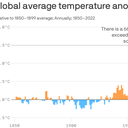World likely to see hottest year on record in next 5 years, UN warns

There is a 66% probability that global average surface temperatures will exceed the Paris Agreement's 1.5°C target during one of the next five years, the UN's World Meteorological Organization warned Wednesday.
Why it matters: This projection, coming ahead of COP28 in Dubai, could be a wake-up call to world leaders about the fast pace of climate change.
Driving the news: The new report, which is based on computer modeling and climate forecasters' input from the U.K. Met Office and other agencies, also concludes it is a near certainty that one of the next five years will be the warmest on record.
- In addition, the WMO notes the five year period of 2023 through 2027 is almost certain to be the warmest such span since instrument records began in the mid-19th century.
- The WMO cites the likely occurrence of El Niño as one reason for the high odds, because it would boost already elevated global average surface temperatures.
Zoom in: El Niño, while naturally occurring, can amplify human-caused climate change by adding more heat to the oceans and atmosphere.
- For example, the current record-holder for the warmest year is 2016, which coincided with a strong El Niño.
- The chance of exceeding 1.5°C, albeit briefly, have quickly risen in recent years, from near zero in 2015 to 10% between 2017-2021, the WMO stated.
- The probability given last year for the period through 2026 was 50%.
Between the lines: The Paris target refers to a long-term average, not exceeding 1.5°C in an individual year.
- But the WMO director foresees the world will soon see global average temperatures eclipsing 1.5-degrees on a more routine basis.
What they're saying: "The WMO is sounding the alarm that we will breach the 1.5°C level on a temporary basis with increasing frequency," WMO secretary-general Petteri Taalas said in a statement.
Meanwhile, a new climate attribution study investigating the April heat wave across Asia found that human-caused climate change made the weather event at least 30 times more likely in Bangladesh, India, Laos and Thailand.
- Climate change also made the heat wave more severe, increasing temperatures by at least 2°C (3.6°F), compared with a world without added greenhouse gases.
Zoom in: In Laos and Thailand, where the heat was especially fierce, researchers found the extreme heat would have been nearly impossible without the influence of climate change.
Yes, but: The new paper uses peer-reviewed methods to examine an event in near-real time, but it has not yet been reviewed on its own.